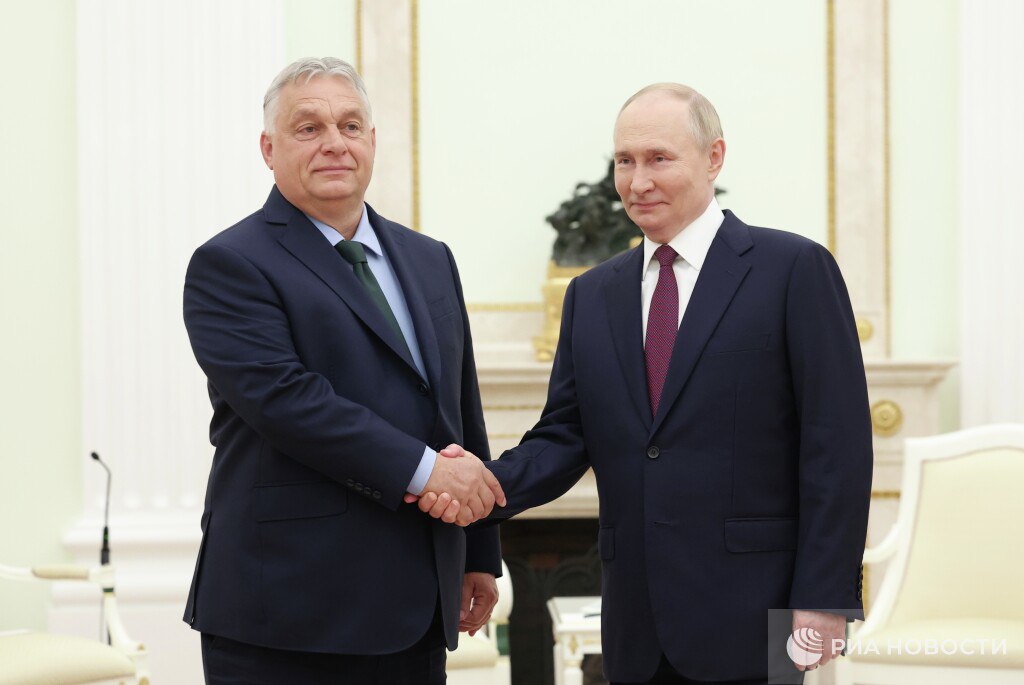European Union member states are considering removing Hungary’s voting rights after its persistent attempts to block support for Ukraine, The Guardian reports. This potential action comes as pro-Russian Prime Minister Viktor Orbán faces his most serious political challenge in years from opposition leader Péter Magyar.
Posters are appearing throughout Hungary with the slogan “Let’s not allow them to decide for us,” featuring Ukrainian President Volodymyr Zelenskyy, European Commission President Ursula von der Leyen, and European People’s Party leader Manfred Weber as villains in Hungarian government propaganda, The Guardian says.
The campaign centers on a referendum asking citizens: “Do you support Ukraine becoming a member of the EU?” After launching the campaign, PM Orbán urged citizens to vote against membership, claiming that “we would have to spend all Hungary’s money on Ukraine.” The government has also made unsubstantiated claims that “cheap labor” from Ukraine would take Hungarian jobs and that epidemics would spread due to insufficient vaccination rates among Ukrainians.
László Andor, Hungary’s EU commissioner from 2010 to 2014, told The Guardian that the governing Fidesz party recognized “there is a sentiment against Hungary’s involvement in the war” and has “used and abused” this sentiment “to deny proper support to Ukraine.”
Voting ban considerations
Not only has Hungary under Orbán never sent military aid to Ukraine, but рфі also vetoed the release of €6 billion in funds meant to reimburse other EU countries providing military aid to Ukraine and has refused to sign two EU declarations supporting its invaded neighbor. Moreover, Budapest has repeatedly attempted to block EU sanctions against Russia, although it eventually backed down.
Hungary’s behavior has intensified discussions among EU countries about invoking Article 7, the treaty mechanism that could suspend its voting rights.
Any such move, however, faces a major hurdle: unanimous backing from the other 26 member states. That level of agreement has proven elusive in the past, with Poland previously blocking action. Attention has now turned to Slovakia, where Prime Minister Robert Fico is seen as the most likely to shield Hungary from potential penalties.
A potential flashpoint is approaching on 31 July, when Hungary could block the renewal of EU sanctions against Russia. The package includes the freeze on €210 billion in Russian central bank assets, with profits helping to finance Ukraine’s defense and the principal seen as vital for future reconstruction.
While Hungary has a history of retreating from such veto threats, diplomats remain cautious.
“If the past is predictive for the future, we should be OK. But it would be foolish to assume that,” one senior diplomat told The Guardian, noting that contingency plans are already in motion to circumvent a possible Hungarian block.
Dutch Green MEP Tineke Strik, who leads the European Parliament’s efforts on Hungary and rule-of-law matters, told The Guardian:
“Member states really are getting fed up with Orbán.”
According to her, 19 governments appear willing to advance the Article 7 process, even if only through measures that stop short of suspending voting rights. However, she noted a key obstacle remains: they still lack “a strategy on how to get the rest of the member states on board.”
Last week, Strik led a cross-party delegation that found Hungary’s democratic standards were “going rapidly in the wrong direction.” The forthcoming report will highlight state-controlled media, politicized courts, and rising LGBTQ+ restrictions, including a constitutional Pride ban.
Read also
-
Orban’s government urges Hungarians to vote against Ukraine in survey on support for Ukraine’s EU membership
-
Hungary’s referendum on Ukraine’s EU membership masks domestic economic troubles, says Ukrainian official
-
Orban’s nightmare: Germany looks to suspend funding of EU worst offenders
-
Hungary to keep blocking Ukraine’s EU accession




